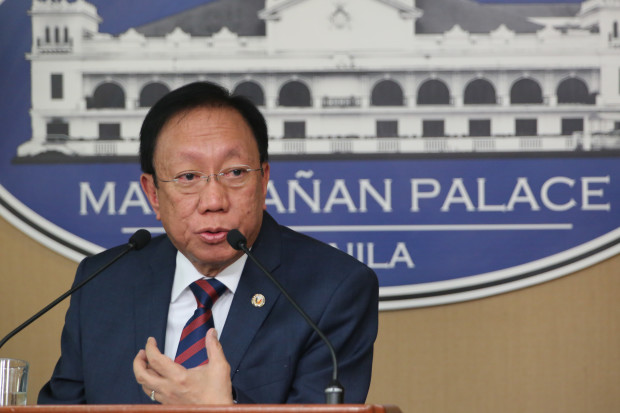
Solicitor General Jose Calida. Presidential Photo
As early as May 18, the government already received information that the local terrorist group Maute is planning to raze Marawi City, hoist the ISIS flag and declare Marawi as an Islamic territory.
The attack was supposed to take place on May 26, the day of Ramadan.
Solicitor General Jose Calida, in his consolidated comment submitted to the Supreme Court Monday, said the attack “would have served as a precursor for other terrorist groups to stage their own uprising across Mindanao in a bid to simultaneously establish a ‘wilayah’ (administrative division) in the region.”
“The planned attack, however, was foiled when government troops conducted a raid in pursuit of Isnilon Hapilon (one of the Maute group leader) in Barangay Basak Malutlut. This forced the rebels to prematurely execute the Marawi siege,” Calida said citing government intelligence reports.
Maute group attacked Marawi in the afternoon of May 23, when the government troops are attempting to raid and capture Hapilon in his hideout.
The Marawi seige that trapped thousands of Marawi residents, killed and wounded several civilians had prompted President Rodrigo Duterte to declare martial law in the entire southern part of the Philippines.
READ: Martial law declared in Mindanao; Duterte to fly back home from Moscow
Calida told the high court that the armed public uprising in Marawi City is depriving the President of his powers and prerogatives.
Aside from occupying public and private institutions in Marawi and pledging allegiance to ISIS, the release of 107 inmates from the Marawi City Jail has deprived the President of his power to keep prisoners in custody, Calida said.
“Given the preceding factual milieu that was presented by the AFP (Armed Forces of the Philippines) in its intelligence reports to President Duterte, he had to act fast. There was no moment to waste,” Calida said thus, Duterte issued Proclamation 216 declaring martial law in Mindanao.
Calida said the declaration should be accorded the presumption of constitutionality as it is within the powers of the president under Section 18 of Article VII of the Constitution as he sought the dismissal of the three consolidated petitions questioning the constitutionality of Proclamation 216.
“There is nothing arbitrary in this reliance, as the President—given his vast responsibilities as head of state, chief representative in foreign affairs, and commander-in- chief of the Philippine armed forces—could not be reasonably expected to personally determine the veracity of all these reports,” Calida pointed out.
He contested the allegation of petitioners that there was no factual basis to justify the proclamation of martial law and the suspension of the privilege of writ of habeas corpus.
The solicitor general stressed that the existing rebellion that posed threat to public safety in the entire island was the main basis for the proclamation, explaining to the high court the link of local terror group Maute to the IslamiC State in Iran and Syria (ISIS).
“The facts relied on by President Duterte for the issuance of Proclamation No. 216 sufficiently establish the existence of a rebellion in Mindanao. ISIS-inspired local rebel groups have taken arms against the Philippine government for the purposed of removing Mindanao from its allegiance, and of depriving the Chief Executive of his prerogatives therein,” read the comment.
Calida also rebutted the argument of petitioners on lack of recommendation from or consultation with the ranking defense and military authorities as reportedly admitted by Defense Sec. Delfin Lorenzana when he briefed members of the Senate and the House of Representatives.
“The recommendation of the secretary of National Defense, or any member of the Executive Department for that matter, is not a condition precedent to the President’s exercise of his power to proclaim martial law or suspend the privilege of the writ of habeas corpus. Consequently, the absence of such positive recommendation does not affect the validity of Proclamation No. 216; neither does it impact on the sufficiency of the factual basis for its proclamation,” he argued.
The SC will hear this case in a three-day oral argument starting today.
There are a total of five martial law-related petitions at the Supreme Court. The three consolidated petitions were filed by opposition lawmakers led by Albay Rep. Edcel Lagman, local Mindanao leaders led by Lumad leader Eufemia Campos Cullamat and a group of women from Marawi led by Norkaya Mohamad.
Two other petitions were filed by separate groups led by former senators Rene Saguisag and Wigberto Tañada, both seeking issuance of a mandamus that would compel Senate and the House of Representatives to convene jointly to review the declaration. The SC has yet to act on these petitions. JPV